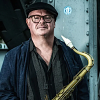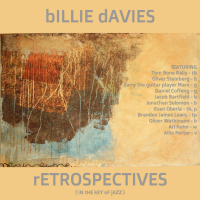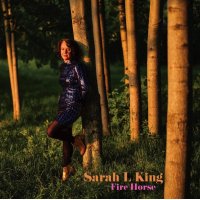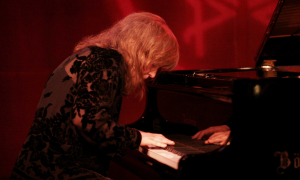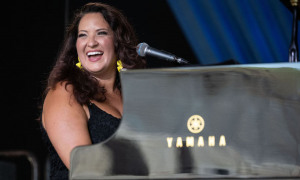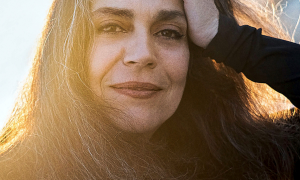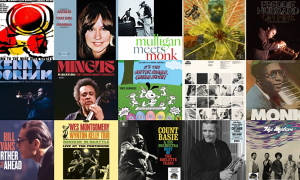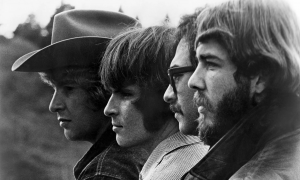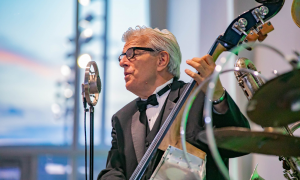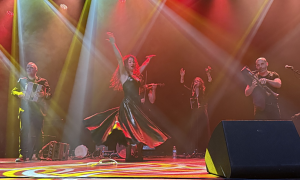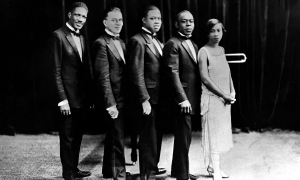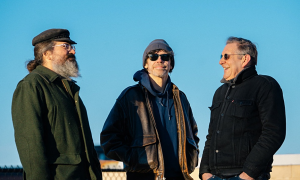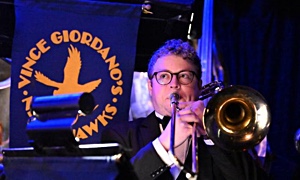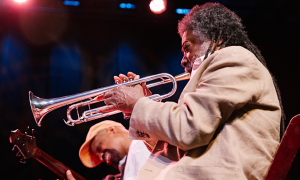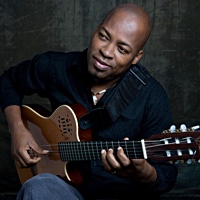Home » Jazz Articles » Interview » Michael Buckley: Blowing Hot
Michael Buckley: Blowing Hot
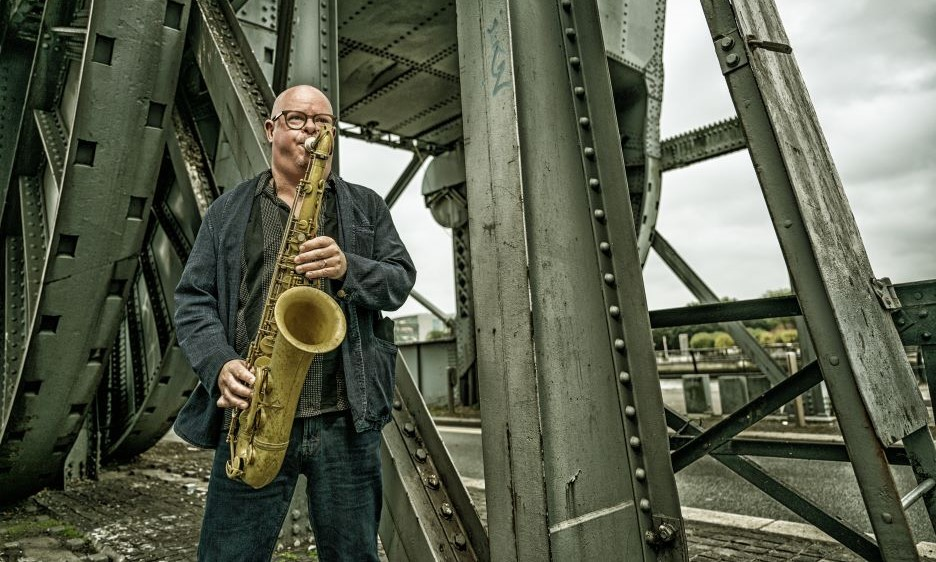
Courtesy John Cronin/Dublin Jazz Photography
Buckley, in fact, started out on the flute, playing with George Coleman no less, on the stage of Dublin's National Concert Hall when aged just ten. It is an instrument he still wields from time to time, though his musical weapon of choice has long been the tenor saxophone.
After a lengthy recording hiatus as a leader, Buckley is back with Ebb And Flow (Livia Records, 2025). Buckley's compositions reveal his penchant for harmonically and rhythmically rich compositions, while his playing demonstrates that he is a match for any tenor saxophonist currently out there.
A self-taught musician, it no doubt helped that he grew up in a musical family, with tenor saxophone-playing father Dick Buckley a veteran of Dublin's jazz scene in the '70s, and his older brother Richie Buckley also a highly accomplished saxophonist.
The younger sibling has certainly used the springboard of a musical family environment to great effect, going on to play with the likes of Kenny Wheeler, John Abercrombie , Dave Liebman, The Mingus Big Band, Ingrid Jensen and Jerry Bergonzi, to name just a few.
As a session musician or sideman Buckley has also recorded fairly prolifically in the world of pop, with credits including Donovan, The Cranberries, Johnny Mathis and Glen Hansard. And since the early 2000s he has also run his own recording studio, The House of Horns, in Dublin, producing everything from jazz and traditional Irish music to hip-hop.
Multiple commitments mean that Buckley's own records as a leader have been all too infrequent for a musician of his caliber. Ebb And Flow, remarkably, is his first straight-ahead jazz release since It Is What It Is (Lyte Records, 2013). The nine originals stem from post-bop roots and strike a tantalizing balance between tradition and modernity. Buckley is in tremendous form throughout, as are drummer Shane O'Donovan, double bassist Barry Donohue and pianist Greg Felton.
Felton was key to the birthing of the music, much of which was trialled with just Buckley and the pianist as a duo. "Strange Taste," the album's vibrant opening track is a case in point: "I was just messing on the piano, I'd just sing the lines and play with the right hand, just improvising," Buckley explains. "Greg recorded it on his phone and then he wrote it out, and two of the tunes are like that. I would never have done that, because you kind of doubt yourself when you're writing a lot of the time. The other tunes are more entailed—there's more detail to them."
Some of the music had been fermenting for years, taking up storage space in Buckley's creative mind. "Sometimes you have just too much; too many scraps of paper, too many voice notes, and you don't finish something. I just had to get them out, to get them out of the way, in a sense, so that you can move on to something new. But I'm very happy with the tunes. It's a good representation of how I think of music. A lot of it is based on harmony. When I play at the piano I'd always hear a voice. I like lush voicings, and I like odd, quirky voicings."
Much of the harmonic language, and the quirkiness, on Ebb and Flow can be credited to Felton, who leaves a large impression on the music. He and Buckley have been playing together since the early 2000s.
"Greg was an obvious choice for this album because it was quite rhythmic. I didn't want a straight bebop album. I wanted it a bit more imaginative than that. Greg is coming from the style of Jason Moran, or from the (Thelonious) Monk thing, and I wanted that rhythmic sense brought into it. So we sat down together and rehearsed for a long time, just making sure that the voicings I wanted were right. So the writing is quite specific on this album, but you still have room to breathe, you know, room to be creative."
Like Felton, O'Donovan and Donohue have been staples of the Irish jazz scene for a couple of decades. "We all have a great deal of time for each other, a great respect for each," says Buckley. "I love Barry's sound. He puts a lot of detail into the sound of the double bass, which I love. And Shane has a very good sense of time. He's a very good timekeeper, but he's not worried about swaying a little bit left or right, you know, and I like that. I don't want it to be too metronomic either, absolutely not. Rhythmically, the music comes in and comes out quite a lot, which makes a nice tension."
Shifting rhythms aside, there was plenty more brewing under the surface of Ebb and Flow that kept the musicians on their toes, Buckley explains. "The keys are not the usual keys that they like to play in, so they're being challenged in awkward keys. You're kind of trying to really use your ear, and I think that's exactly what I wanted. I've listened to albums where you can hear musicians bringing their woodshedding practice to the gig, and I don't really like that. So, I try and keep away from that as much as I can."
Buckley has had big ears from the get-go. "I'm kind of self-taught. I picked up the flute from a very young age. That was my first instrument. It was just from listening to records, to the vinyl and tape collection at home. I was just playing along with records. That was the most important way for me to learn, because you're taking it all in subliminally. I hear a lot more of the older players saying that they just learned from playing records, but a lot of younger guys don't do that anymore."
Avoiding straight bebop for Ebb and Flow may have been Buckley's aim but the music's spirit is present, as is a large tract of the entire history of jazz. The quartet swings, plays in and out and navigates sophisticated harmonic and rhythmic terrain. It is as if all the tributaries of jazz—swing, bop and post-bop, modal and free jazz have converged in the great, swirling river that is Buckley's idiom.
"I listen to jazz from the '40s right up to now, all the different styles, and I don't shy away from it. There's been this idea for a long time that if you change styles then you're not true to yourself, you know, you don't have your own style, which I don't really believe. I do believe that a saxophonist or a trumpet player should be able to play every style, and you can bring that, all of them styles, into your own thing."
Buckley understands that his openness to all styles of jazz, indeed, to all music, is the key to musical freedom. "I definitely have my own voice that I found over the years," he asserts, "but that came from playing everything."
This philosophy echoes that of Sonny Rollins, whose encyclopaedic solos reflected his youthful appetite—and ear for—calypso, the music of the Sanctified church, cinema music, the rhythm 'n' blues of Louis Jordan, radio theme tunes and much more besides.
At first glance there seems to be a nod to Rollins on Ebb and Flow's cover. The photo, by Dublin Jazz Photography's John Cronin, was taken in the city's dock and frames Buckey blowing his 1952 Selmer by what looks like a Dublin bridge. It is impossible not to be reminded of Rollins' fabled three-year practice regime on Williamsburg Bridge, an exile of sorts which began in 1959 and concluded with the album The Bridge (RCA Victor, 1962).
The truth, however, is less romantic. "I was just looking for somewhere that was different. It was basically an old dock crane that's not in use anymore. I thought, let's just try it, and when I saw the pictures back I loved it. I mean, it has that very New York skyline thing to it as well, but it didn't have anything to do with Rollins," clarifies Buckley.
"With so many albums nowadays you don't know what the music is. Is it funk? Is it r&b? Is it rock? Is it jazz? What is it? I wanted to have an album where the picture says very clearly, this is a saxophonist."
Another jazz great whose approach is perhaps more of an influence on Buckley, at least as far as Ebb And Flow goes, is Kenny Wheeler. In March, to launch the book Song For Someone: The Musical Life of Kenny Wheeler by Nick Smart and Brian Shaw, Buckley joined Shaw in a quintet that played Wheeler's music at Arthur's Blues & Jazz Club, Dublin. For Buckley it marked a musical reconnection of sorts, having played with Wheeler when the Canadian came to Dublin in 1998.
"Kenny's music is quite difficult to play. the melodies there are very simple, nice weaving lines, but the harmony is quite tricky. Kenny wrote music that is challenging for the musician, but not overly challenging for the audience. I think Kenny always did that very well, and that's actually one thing I wanted for my album Ebb And Flow. I feel I got it right on the button."
One of the standout tracks on a consistently strong album is the ballad "That's All Fowlkes," a homage to trombonist Curtis Fowlkes, who died in 2023. Buckley and Fowlkes had often toured together in singer/songwriter Glen Hansard's band.
"We worked together for about 15 years," says Buckley. "Even when we weren't on the road we'd always stay in contact with WhatsApp every second day. He was just one of the warmest persons I've ever met in my life. I hung out with him in New York when I was over here for a bit. It was amazing to walk down around the Village, around the Vanguard and places like that. Everybody knew Curtis and everybody loved him. And that's kind of a rare thing, especially in the States. He played with everyone. I mean, he played with so many legendary bands over the years. He had great stories, and he was such a great player."
The birthing of "That's All Fowlkes" was different to the other tracks on Ebb And Flow. "It was the one song that wasn't penned," Buckley explains. "I would practice some things on the piano sometimes, a set of chord changes. And there was a tune called "Warm," and it was from an old Broadway musical. I was checking out the changes of it and I had them scribbled down. I wanted to do something for Curtis, but I didn't know which way to go about it. So, I said to the guys, look, just play these chord changes. There was no pre-done melody. It's improvised nearly the whole way through, And I don't even play the melody from the show tune. I remember doing it, and I said, that's Curtis's tune. That's definitely it. It was the first and only take.
"It was emotional for me, I do have to say. There's one part in it where I play, I can actually hear Curtis nearly laughing. It's like I was mimicking him laughing. He was some character, always great craic. We were all really gutted and cut up about it. We will miss him."
Buckley recorded Ebb And Flow in his own The House Of Horns studio, which he has been running since 2008. "It's like a small cottage with double walls. The main room has an old desk and there's a big drum room at the end. I suppose the studio is based around this desk—a WSW Wiener Schwachstromwerke. It's got a vintage feel, but it's got its Pro Tools down as well, so you've got the new and the old. I've invested over the years in different microphones, and I learned how to engineer. I mix and master, I do everything in-house."
People often ask Buckley how he can record his own album without an engineer, but his answer is simple: "I just roll the tape and then we play. I've been doing it a long time and I have my own method of doing it."
Not only is the playing on Ebb And Flow out of the top drawer, but so is the album's sound. "I was happy with how it worked out sonically," Buckley says. "It turned out great. I suppose I went a little bit heavier on reverbs and stuff than most people would do, but I just wanted a warmer feel to the album. I didn't want that dry, modern feel. There's not a lot of post-production on it. Really, what you hear is how it went down through the desk. I didn't want to start fiddling with it later."
For most jazz artists the costs of commercial recording studios tend to dictate that albums are usually recorded in just one or two days. For Buckley, there were no such pressures recording Ebb and Flow. "It's obviously a great advantage to have your own studio to record your own music."
Buckley was in no hurry to get the music in the can. It had to done just right. "We were well-rehearsed. We'd done some gigs before, but I still wanted a week because the music was quite challenging, and I didn't want to do overdubs or drop-ins or something. We'd maybe play two tunes one day. We didn't do any crazy, late nights. If somebody was tired we'd leave it and do three tunes the next day."
That is not to say that Buckley was striving for perfection, a chimera if ever there was. "I actually didn't spend as much detail as I would on someone else's album. I guess I'd heard the music so much, and then I just wanted to finish it. You know yourself with your own song when it's done. It doesn't need anything else."
Ebb And Flow is out on Livia Records, the historic Irish label founded by the late Gerald Davis in the '70s. The label folded when Davis passed in 2005, but has been revived under Dermot Rogers, initially to rerelease archival recordings, long out of print, of guitarist Louis Stewart and his peers. Buckley's album is Livia Records' first contemporary jazz release.
Having done the mastering for Rogers on several Stewart re-releases on Livia Records, it was perhaps something of a no-brainer when Rogers suggested Buckley record Ebb And Flow on his label.
"I have to say Dermot has been amazing," offers Buckley. "He did stellar work there. His push for reviews and trying to get it out there, radio play, you know, it's been brilliant. Just his whole attitude to press, press packaging and stuff like that—he gets it.
"He really has his finger on the pulse, the quality of the productions, the sound quality, it's really, really great. And particularly to get Louis' albums out again—a lot of the stuff that's been so hard to get on CD for years—is a real service. Dermot's doing a fantastic job with Livia Records," Buckley acknowledges.
The Ebb And Flow quartet has gigs lined up this year, but Buckley is already looking ahead. "We're probably going to do a few festivals later this year and next year as well. Yeah, there will be a push now to do a few more. It's one of them bands I want to record again as well. It doesn't even have to be a full album, it could be one or two tracks, just to keep the thing going."
As ever, Buckley has more than a few irons in the fire. His tenures in both the Mingus Big Band and with Glenn Hansard are ongoing, though his biggest headache is clashing dates. A trio recording is also in the pipeline with bassist Ronan Guilfoyle and drummer Darren Beckett.
One wonders if Buckley might be tempted to go back to his first instrument, the flute. "I would like to record something with the flute. I'd love to do an album with strings, a chamber orchestra. But I'd have to stop playing the sax for a week or two, just to get the lip in. It's quite challenging because the embouchure for sax and flute is different, so when you pick up the flute after playing the sax the sound really isn't there."
A March concert at Magy's Farm (see review here), where Buckley toggled between saxophone and flute quite beautifully, provided evidence that his flute chops appear to be in terrific working order. "Things like the gig at Magy's Farm give me a kickstart to get up off my ass and practice a little bit more," Buckley says. "I have to just get back into it a bit and back to some of the rudiments. I just haven't played in so long, but it is a great instrument. I want to get back into it a bit."
Nor does the family jazz dynasty show any signs of waning. "My son is playing saxophone now. He's 22 years old. He's studying at DCU (Dublin City University), Ronan Guilfoyle's school, and he's coming on great. He loves it, like, soaking it up."
Whilst Buckley senior encourages his son to practice, his own regime has evolved over the years. "I practice kind of internally. I sing and I move my fingers and stuff. That can get quite obsessive where it's hard to turn it off. But sometimes I practice like that and then I just pick up the instrument."
Beyond woodshedding, Buckley emphasizes the importance of mental training. "What I find with jazz and with music in general, and I've tried to tell my son this, is that it's more of a mind game. I think how your mind works when you're playing is more important than practice. You know, how relaxed you are, and not getting bogged down in being competitive or beating yourself up too much if you're not playing great, or think you're not playing great. I think of it like sports psychology.
"The mind has to be worked on, especially when playing with new people, famous people. I've always played gigs with American players, and your mind has to be right. If your mind game is not right, it doesn't matter how much you've practiced, you can find yourself in trouble. Yeah, the mindset is as important as the technical side of it. I think it's even more important."
Tags
Comments
PREVIOUS / NEXT
Michael Buckley Concerts
Support All About Jazz
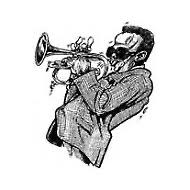 All About Jazz has been a pillar of jazz since 1995, championing it as an art form and, more importantly, supporting the musicians who make it. Our enduring commitment has made "AAJ" one of the most culturally important websites of its kind, read by hundreds of thousands of fans, musicians and industry figures every month.
All About Jazz has been a pillar of jazz since 1995, championing it as an art form and, more importantly, supporting the musicians who make it. Our enduring commitment has made "AAJ" one of the most culturally important websites of its kind, read by hundreds of thousands of fans, musicians and industry figures every month.


